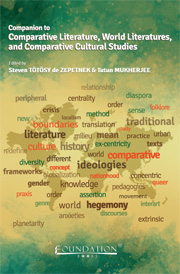Book contents
- Frontmatter
- Contents
- Introduction to the Companion to Comparative Literature, World Literatures, and Comparative Cultural Studies
- PART 1 Theories of Comparative Literature, World Literatures, and Comparative Cultural Studies
- The Contextual Study of Literature and Culture, Globalization, and Digital Humanities
- Comparative Literature and Ex-centricity
- Possibilities and Limits of Comparative Literature Today
- Comparative Cultural Studies and Pedagogy
- Teaching World Literatures
- Comparative Literature and the History of Literature
- Meltzl de Lomnitz, Comparative Literature, and Philosophy
- Comparative Cultural Studies and Cultural Anthropology
- Comparative Literature and Interart Studies
- Gender and Genre in Comparative Literature and (Comparative) Cultural Studies
- Comparative Cultural Studies and Translation Studies
- Comparative Cultural Studies and the Study of Medieval Literature
- Comparative Cultural Studies and Linguistic Hybridities in Literature
- Comparison and Postcoloniality
- (Inter)mediality and the Study of Literature
- PART 2 Comparative Literature in World Languages
- PART 3 Examples of New Work in Comparative Literature, World Literatures, and Comparative Cultural Studies
- PART 4 Multilingual Bibliography of Books in Comparative Literature, World Literatures, and Comparative Cultural Studies
- Index
Comparative Cultural Studies and Cultural Anthropology
from PART 1 - Theories of Comparative Literature, World Literatures, and Comparative Cultural Studies
Published online by Cambridge University Press: 05 April 2014
- Frontmatter
- Contents
- Introduction to the Companion to Comparative Literature, World Literatures, and Comparative Cultural Studies
- PART 1 Theories of Comparative Literature, World Literatures, and Comparative Cultural Studies
- The Contextual Study of Literature and Culture, Globalization, and Digital Humanities
- Comparative Literature and Ex-centricity
- Possibilities and Limits of Comparative Literature Today
- Comparative Cultural Studies and Pedagogy
- Teaching World Literatures
- Comparative Literature and the History of Literature
- Meltzl de Lomnitz, Comparative Literature, and Philosophy
- Comparative Cultural Studies and Cultural Anthropology
- Comparative Literature and Interart Studies
- Gender and Genre in Comparative Literature and (Comparative) Cultural Studies
- Comparative Cultural Studies and Translation Studies
- Comparative Cultural Studies and the Study of Medieval Literature
- Comparative Cultural Studies and Linguistic Hybridities in Literature
- Comparison and Postcoloniality
- (Inter)mediality and the Study of Literature
- PART 2 Comparative Literature in World Languages
- PART 3 Examples of New Work in Comparative Literature, World Literatures, and Comparative Cultural Studies
- PART 4 Multilingual Bibliography of Books in Comparative Literature, World Literatures, and Comparative Cultural Studies
- Index
Summary
Abstract: In his article “Comparative Cultural Studies and Cultural Anthropology” Rik Pinxten postulates that the fields of anthropology and comparative cultural studies represent an advantageous approach to knowledge about social and cultural processes. Further, Pinxten argues that cultural anthropologists have been growing less exclusionary about the methods and the objectives of comparison and suggests that this development resulted in new epistemologies of scholarship about the “other” towards an emic-etic approach to linguistic and cultural phenomena. Pinxten postulates that cultural anthropology complements (comparative) cultural studies in a way similar to the latter's complement to the study of literature. Thus, comparative cultural studies adds a critical approach by contextualizing literature, as well as other productions of culture.
Introduction
Cultural anthropology has a long history in comparative studies. Since anthropologists are dealing with cultures from a vast variety of origins and since they do labour-intensive fieldwork most of the time, ethnography has yielded a disparate set of data about humans and their cultures (on cultural studies and ethnography, see, e.g., Marcus). The risk for discipline, however, can result in idiosyncratic knowledge: particular data about an endless variety of behaviours, thoughts, customs, and rituals. In terms of description, this occasioned a treasure of data on humankind and in terms of science this is problematic. Science strives for universal knowledge, for invariance, and generalized propositions. In order to produce this type of knowledge in cultural anthropology the task is to do so with the comparative approach.
- Type
- Chapter
- Information
- Companion to Comparative Literature, World Literatures, and Comparative Cultural Studies , pp. 112 - 123Publisher: Foundation BooksPrint publication year: 2014



